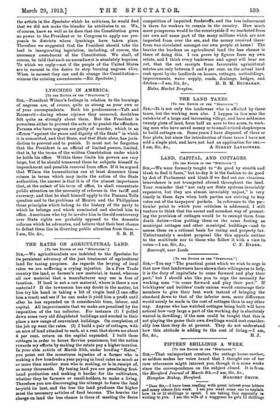THE RITES ON AGRICULTURAL LAND.
[TO THE EDITOR OF THE " SPECTATOR:1
SIR,—We agriculturalists are indebted to the Spectator for its persistent advocacy of the just treatment of agricultural land for taxing purposes. As regards the levying of local rates we are suffering a crying injustice. In a Free Trade country the land, or farmer's raw material, is taxed, whereas all raw material that a manufacturer may use is free of taxation. If land is not a raw material, where is there a raw material If the townsman has any doubt in the matter, let him try his hand in taking a bit of virgin land (I can offer him a tract) and see if he can make it yield him a profit until after he has expended on it considerable time, labour, and capital. All improvements that we make are penalized by the imposition of the tax collector. For instance (1) I pulled down some very old dilapidated buildings and erected in their place a new range of convenient buildings. On completion of the job up went the rates. (2) I build a pair of cottages, with an acre of land attached to each, at a rent that shows me about 4 per cent. return on the capital expended. I built these cottages in order to house Service pensioners, but the nation rewards my efforts by making the estate pay a higher taxation. In your able article of March 15th, under heading "Rates," you point out the monstrous injustice of a farmer who is making a few hundreds a year paying in local rates is much as or more than another man who is making, or is in receipt of, as many thousands. By taxing land you are penalising first- hand production and making it harder for the cultivators, whether they be farmers or small-holders, to make a living. Therefore you are discouraging the attempt to force the land to-yield its best, and the less the land produces the higher must the necessary articles of food become. The heavier the charge on land the less chance is there of meeting the fierce competition of imported foodstuffs, and the less inducement is there for workers to remain in the country. How much more prosperous would be the countryside if we marketed from our own soil some part of the many millions which are now imported from over the sea, and the money received there- from was circulated amongst our own people at home ! The heavier the burdens on agricultural land the less chance is there of doing this. I can prove by figures from my own estate, and I think every landowner and agent will bear me out, that the net receipts from favourable agricultural estates are only between 3 and 4 per cent. on the actual hard cash spent by the landlords on houses, cottages, outbuildings, improvements, water supply, roads, drainage, hedges, and,










































 Previous page
Previous page